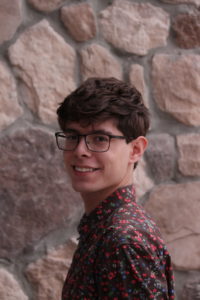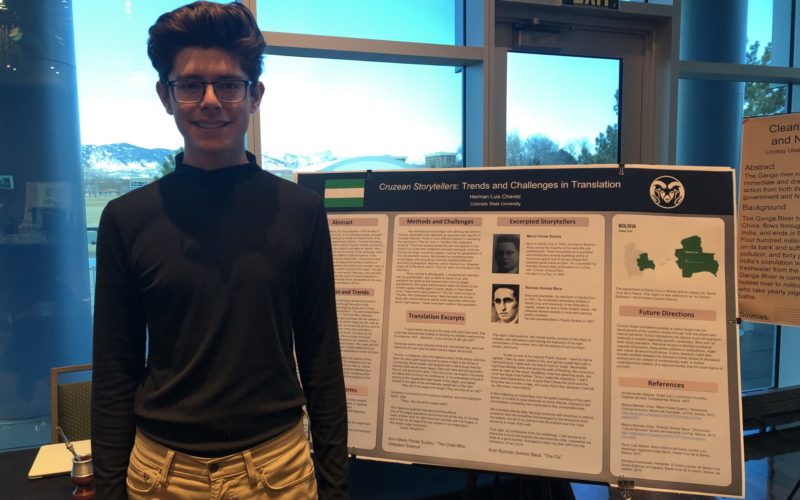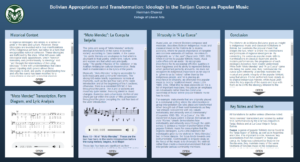
Earlier this spring, Herman Chavez got some thrilling news. He had been selected to present his research on Bolivian cuecas – a traditional Latino American dance and music style – at the Richard Macksey National Undergraduate Humanities Research Symposium at Johns Hopkins University. The three-day symposium in Baltimore brings together students across all fields of the humanities to network and share their research.
Chavez’s research project was not just an academic endeavor, it was deeply personal. Drawing on his Bolivian heritage, his love of music, and his cross-disciplinary interests, Chavez crafted a research project that informed both his studies and his identity. Though the symposium shifted online in response to COVID-19, Chavez’s research has had a lasting impact on his undergraduate experience.
Notes of passion
Chavez enrolled at CSU with a passion for cello and initially intended to pursue music education. He quickly discovered his academic interests could not be limited to one discipline. Chavez decided to tailor his own course of study by declaring an interdisciplinary liberal arts major in addition to his primary majors in cello performance and pedagogy.
“It was a degree program in which I could craft exactly what I wanted to study,” said Chavez.
Chavez declared minors in English and Spanish and took courses in ethnic studies, but his interest in music remained.
“My relationship with music is something that has changed from simply teaching students to understanding why barriers exist for students who don’t have access to music and what music creation looks like for students who come from marginalized or diasporic backgrounds,” said Chavez.
Bolivian roots
Chavez’s mother and much of his extended family are from the Tarijan department of Bolivia. His visits to the country allowed him to connect with his family and the culture of the country. From being a part of a Bolivian youth symphony to enjoying the music, dance, and culture the country has to offer, Chavez says he continually learns more about being “a part of my family’s culture, where we come from, and who we are.”
He now studies Bolivian music and literature to better understand himself and his roots.
Interdisciplinary and collaborative research
Chavez first connected with undergraduate research through the University Honors Program. In an English Literary Theory and Criticism course with Professor Ryan Claycomb, Chavez was introduced to Louis Althusser’s theory that ideology is an extension of the state, where even cultural creations exist because of acceptance from the ruling government. Chavez recognized the connection with this theory when examining Bolivian history and the rise of indigenous popular music following the nationalist revolution in 1952.
Chavez focused his research on the cueca, a dance song originating in the department of Tarija. During one of Chavez’s trips to Bolivia, his aunt had given him sheet music. When he began playing this music, he realized that it was much different from the cuecas he had heard in Tarija. Since there was no sheet music for these cuecas, he transcribed them and did a comparative analysis of the cuecas through the lens of Althusser.
Because the government has a certain amount of control over creative works, the “official” versions differ from the traditional versions. While existing research gives insight into indigenous music and classical institutions in Bolivia, Chavez’s research looks at the popular music that bridges the two and how regional ideologies are portrayed.
The impact of research
This research has allowed Chavez to explore his identity while connecting interests in music, culture, and language.
“It has made me feel more reaffirmed in my own cultural identities, and as if I can advocate and represent those communities more in the United States and other global presences,” said Chavez.
Beyond the Johns Hopkins symposium, Chavez has been able to share his research with his professors, members of the Musicology club, and other students.
“Sharing this research opens so many doors,” said Chavez. “My advice for any undergraduate doing research is to share it with as many people as you can, because in doing so it not only educates those people and allows you to impact those communities but it also opens doors for that information to continue to impact others.”
Chavez featured at annual CURC showcase
In April, Herman Chavez was invited to participate in CSU’s annual Celebrate Undergraduate Research and Creativity showcase. Held each April, the showcase recognizes students’ achievements and honors what they have learned as a result of their scholarly research, scientific inquiry, and/or creative endeavors.
Chavez’s presented his research topic, “Bolivian Appropriation and Transformation: Ideology in the Tarijan Cueca as Popular Music,” through a multimedia poster that included audio samples, sheet music, and analysis. Chavez’s work was featured alongside 18 other students from the College of Liberal Arts in the CURC 2020 Online Gallery.

Enhancing the scholastic experience
Receiving performing arts and academic scholarships, including the Margaret Klempera scholarship for young music educators, has opened doors for Chavez.
“These scholarships have really allowed me to continue to do that creative work that has been foundational to my other studies,” said Chavez.
Chavez believes meaningful and purposeful involvement add to his college experience. He is a founder of the Musicology club, a SLiCE involvement officer, mentor at La Cocina, a teacher for the CSU Middle School Ensemble program, a co-managing editor of literary arts publication Spiritus Mundi, and a diversity and community engagement intern with the Poudre River Public Library District.
In his first two years at CSU, Chavez has already accomplished an incredible amount. His research demonstrates the capacity of the arts and humanities to promote global learning, and his dedication to cultural awareness and community collaboration embodies CSU’s principles of community. As he continues his studies, research and involvement will continue to play a key role.
“I think Rams do not just settle for the classroom but strive to take that content and knowledge and transform it into something that is their own,” said Chavez.
